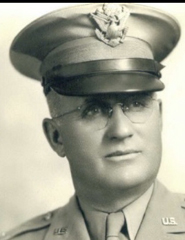German Shelling Forces Miles to Hide Under Tank
By FRANK MILES
(Iowa Daily Press War Correspondent)
With the Fifth Army in Italy (IDPA) -- T/5 Zaccheus Stemm of Lucas, commanding a bull dozer tank, and three comrades were halted by enemy fire at the edge of a mountain road 1,500 yards across a valley from nazi-occupied Firenzuola. They had been cutting paths for vehicles and infantrymen and then were closer to the Germans than any other Americans within the Gothic line.
Col.Stanley J. Grogan, chief of the Fifth army public relations section; John McTigue, of United Nations News, and I, with an army private as driver in one jeep, and Maj. Henry Ehrlick, Brookline, Mass., a PRO officer, and Art Carter, of the Baltimore Afro-American, with PFC. Paul Latoski, Bay City, Mich, at the wheel in another jeep, came upon the tank. They found no signs of human life around.
Hear Voices Inside Tank
Col. Grogan seized a tommy gun upon hearing low voices inside the machine. He called for whoever was in there to come out with hands up. After a couple of exchanges in English, Stemm and his men emerged from the port holes, happy to learn we were friends. They had sought safety in the tank from shelling.
Stemm, 22, stocky and rugged, the son of Charles Stemm, was a farm boy before he joined the army Jan. 4, 1942. He has seen a lot of action, wanted to see the conflict through, and said that when it was he was going straight back to Iowa -- to stay the rest of his life.
Warning that we were too close to the nazis, McTigue went back to keep others of a party with whom we had started, from following because jeeps might draw fire.
Col. Grogan, Major Ehrlich and Latowski crept through the woods to a stone farm house 100 yards from the tank to see what was in it. Stemm and I leaned against one of the standing jeeps to talk about Iowa and the others sat nearby.
Suddenly, whistling sounds and explosion of two shells near Stemm and I made us realized the nazis had spotted us. Stemm leaped across the road and rolled under the tank. I followed him a split second later. Three others already were there and two had dived down the tank port holes.
Shells whistled and crashed all around us. One landed close enough to throw dirt and stones over those of us on the ground. We felt the earth vibrate and smelled powder
There was a short lull. The nazis then opened up on the building where Col. Grogan, Major Ehrlich and Latkowski were. They caught it for a time. While we had a breathing spell, we smoked and kidded a bit and expressed hopes that they would be lucky. I prayed, too. No doubt some of the others did.
Hit Trees Above
Another lull, and we got it again. This session the nazi shells tore limbs off trees above us until the last shot in our immediate direction hit the roadside only a few feet from the tank but happily did us no more damage than to hurt our ear drums. After that they again turned their shelling on the farm house.
Shortly after they ceased firing, Col. Grogan, and his companions joined us. We jumped into our jeeps and left there at racing car speed. I wondered later what the fate of the four GI's we left might be.
The house Col. Grogan and his companions explored had been used as a collecting station by the Germans. Twelve dead bodies were in one room and medical supplies, three bicycles, an alarm clock and other things had been left. Bread, cheese, bazookas, cartridges, articles of clothing and other equipment had been abandoned by the nazis in their flight from the determined, advancing American troops, but they were fighting fiercely as they retreated.
En route and returning, we saw many nazi dead, prisoners, acres of trees splintered by our artillery, shattered pill boxes and other evidences of German defeat. For miles we saw Italian soldiers attached to the fifth army leading mules bearing packs of food and munitions to where Yanks would go that even jeeps couldn't reach. We saw four mules with dead nazis on their backs, and some ambulances bound for evacuation hospitals. It was modern warfare in full realism and I got a much bigger taste of it than I would have asked for.
Source: Muscatine Journal News-Tribune, October 23, 1944
![]()

